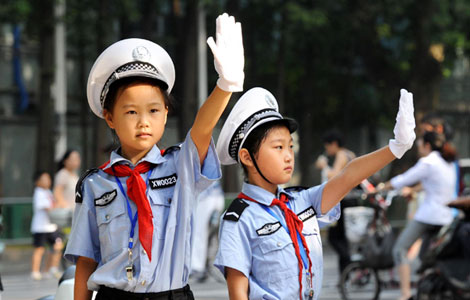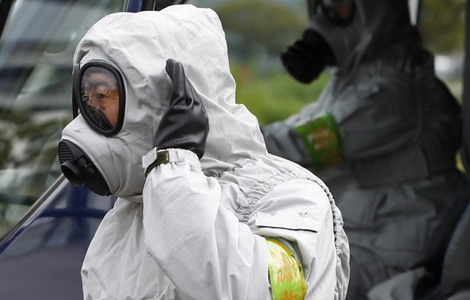Time to go back to school
Updated: 2011-09-01 22:33
(Xinhua)
|
|||||||||||
BEIJING - "Bagater, time to get up! A new semester comes," an ethnic-Mongolian mother from north China's Inner Mongolia autonomous region told her son at 6:30 on Thursday morning.
Bagater, a 12-year-old boy from the Hohhot Mongolian School, opened his eyes, yawned and stretched. He got used to sleeping in late during the summer vacation, but he still rushed to prepare for school.
Like Bagater, some 260 million primary and middle school students from across China made their way to schools that start their autumn semester in early September.
In Inner Mongolia's capital city of Hohhot, increasing numbers of cars and bicycles ushering children to school were seen during the rush hour, and more traffic police were assigned to direct traffic.
"I must get up early from now on, but it's good to see plenty of friends at school," Bagater said.
As instructed by the Ministry of Education, all of the primary and middle school students across the country started their first class Thursday morning by watching an inspirational television program titled "Where is Happiness."
Migrant worker's children take a different route
This year's autumn semester kicked off with the controversial closure of over 20 schools for migrant workers' children in Beijing.
More than 14,000 children, mostly in the city's outlying Haidian, Chaoyang and Daxing districts, were affected by the school closings, the Beijing Municipal Education Committee said last month.
Su Qi packed her schoolbag on the first day of the new semester. She was not heading off to school, but preparing for the next day's long journey to her hometown.
The Dongba Experimental School, which Su once attended, was put on the demolition list this July during an official campaign against unsafe and unhygienic school buildings. More than 1,200 students attending the school will matriculate into other schools.
Upon learning that there were not enough openings in nearby schools to accommodate all the children where Su lives in Dongba village, Haidian district, her father decided to send her home for further schooling.
"My daughter was rejected, owing to limited school spaces in the county, so we would have to go 10 kilometers away to another school for a try," Su's father said. "This is too much trouble and I have decided to send her back."
Like Su, a total of 1,900 children in Dongba village could not be admitted to local schools, said Wan Tianbing, the former head teacher of the Dongba Experimental School, which is set to be demolished.
He added that all of the county's schools could only absorb 2,000 students, but 3,900 students who lost their classrooms over the summer needed spots.
Compared to Su, Wang Miaomiao was lucky. After her former school closed, the girl was sent to a new school along with some of her other classmates.
"The new school is more beautiful than the old one, and closer to my home," Wang said.
Since Wang is at the stage of compulsory schooling, she needed to turn in 350 yuan (about $53.80) for this semester in the new school, about 450 yuan less than for her previous school.
Still, it was no small amount for her mother Dou Lingling, who earns only 2,000 yuan a month working as a nursemaid.
"We have always hoped to sit in a big classroom and receive an education like urban children," Wang said. "Although this school is still not as good as some public schools in Beijing, I feel really satisfied."
Freshmen need 'ablactation'
While youngsters started off for their first day of school, approximately 30 million college students left home and registered for the new term.
As many freshmen were busy welcoming new environments and lives, their parents and even grandparents were fully occupied as well.
In central China's Wuhan International Trade University, newly-enrolled student Wang Dan did not feel lonely despite leaving home for the first time.
Wang's father and elderly grandparents accompanied her, worried that the 19-year-old girl may not take good care of herself at college.
Her grandparents helped look after her luggage in the sun, while Wang's father sweated and rushed to buy articles for her daily use.
"Although it's a big sum of money for the three of us to come here with her, we would feel worried if she came alone," Wang's father said.
The same scene was set on nearly every campus during the first few days of the new term. A freshman from East China's city of Ningbo attracted media attention when he showed up to enroll for classes accompanied by his parents and seven other relatives.
Liu Jianhong, a teacher with Jimei University in Southeast China's Fujian province, reckoned that most of the freshmen come from one-child families and receive too much care and protection from their parents.
"Parents should regard university enrollment as a second chance for their children's 'ablactation,' and let them independently do their own things," Liu said.
Boy's cremated remains go to school
Although 13-year-old Huang Xianze died in a traffic accident one year ago, he was still included in the lively atmosphere surrounding his school's opening day.
In south China's city of Guangzhou, Huang Qunzhen, the boy's father, carried the ashes of his son on his motorbike Tuesday and circled the middle school his son once attended.
On his back, Huang wore his son's schoolbag containing a quiz with a score of 99, just one point away from a full mark. On the paper was the father's signature. It was the last quiz he had signed for his son.
Huang Qunzhen appeared sorrowful when discussing his ride to the school.
"I do this to realize my son's dream of continuing with school, " he said.
The boy was smart, thoughtful and excelled academically, he added.
Huang also hoped his act could warn other students that they must take care of themselves when walking or riding bicycles to school.
"Hopefully a tragedy like my son's will never happen again," he said.
- No taxation on adding spouse's name on property
- China-Eurasia Expo opens in Urumqi
- China delays Tiangong-1 launch
- Iceland land deal 'purely commercial'
- Sino-Philippine trade to double
- Authority verifying Conoco oil leak claim
- China-Eurasia Expo opens in Urumqi
- Conoco's oil leak claim not verified by China
Hot Topics
Libya conflict, Gaddafi, Oil spill, Palace Museum scandal, Inflation, Japan's new PM, Trapped miners, Mooncake tax, Weekly photos, Hurricane Irene
Editor's Picks

|

|

|

|

|

|







